Last Updated on March 24, 2024 5:15 PM IST
- What are no-code app builders?
- The Easiest No-Code App Builder For You
- Pros & Cons of No-Code App Builders
- Is No-Code the Future of App Development?
- Will No-Code Replace Developers? Fears Overblown, Future Empowered
- Building Apps Without Breaking the Bank: Free No-Code App Builders
- Finding Your Perfect Fit: Choosing the Right No-Code Platform
- Beyond Drag-and-Drop: Mastering Advanced No-Code Techniques
- Security & Privacy in No-Code Apps
- Wrapping Up
- FAQs
Every business out there, including yours, needs its own special app, right? In 2021, companies globally were hooked on an average of 110 different software apps! That’s how deep their tech love runs! But what if coding a custom app feels like climbing Mount Everest in flip-flops? If you are a tech-savvy friend, don’t lose hope because you will see the dawn of the easiest no-code app builder in this guide.
Say goodbye to the days of cryptic syntax and hello to the drag-and-drop revolution, where anyone (yes, even YOU) can build a fully functional app without writing a single line of code.
Now, back in the day, making apps was like a secret code only the super-smart coding wizards could crack. But hey, when the app demands shot through the roof and programmers got swamped, guess who stepped in? No-code tech!
These magic platforms let non-techie folks bring their app dreams to life. It uses 70% fewer resources than the old-school coding methods. Imagine transforming your brilliant ideas into polished apps – e-commerce platforms brimming with your unique products, productivity tools that streamline your workflow, or engaging games that captivate your audience.
Cool, right?
Let’s unwrap the wonders of creating apps without breaking a sweat!
What are no-code app builders?
Platforms or tools that enable you to build apps without programming experience. They simplify the app development process by using visual interfaces and pre-built segments.
Imagine a world where your brilliant app idea isn’t hostage to your programming skills. Enter no-code app builders, where drag-and-drop interfaces and pre-built modules pave the way for anyone to become an app creator. No need for cryptic code or years of software engineering courses – these platforms empower entrepreneurs, marketers, educators, and even hobbyists to bring their digital dreams to life.
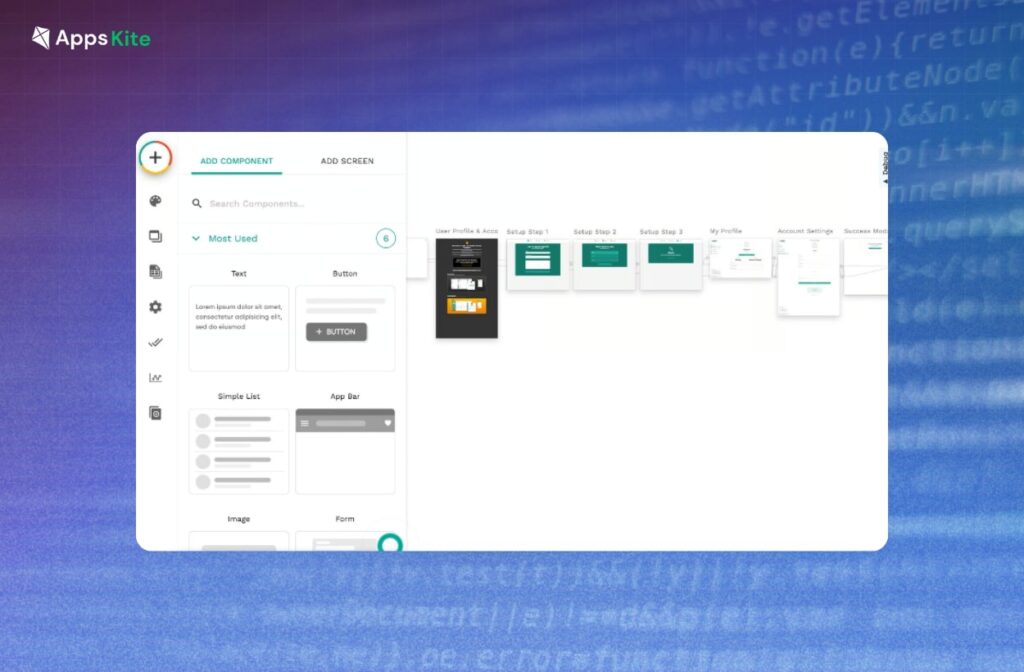
Think of it as Lego for apps. Instead of lines of code, you have visual blocks representing features and functionalities. You snap them together, customize the designs, and voila! You’ve got a functional prototype or even a fully deployable app, ready to conquer the app store. This removes the technical bottleneck, letting your creativity and problem-solving skills take center stage.
But no-code isn’t just about simplicity. These platforms are surprisingly sophisticated, allowing you to build complex functionalities like user authentication, data integration, and even AI-powered features. Imagine building an internal workflow tool for your team, a marketplace app for local artisans, or an educational game for kids – all without writing a single line of code.
This democratization of app development is more than just a technological feat; it’s a paradigm shift. No-code empowers individuals and businesses to build solutions that were once out of reach, fostering innovation and agility in all corners of the digital landscape. So, whether you have a million-dollar idea or just a nagging problem you want to solve with an app, no-code offers a blank canvas and a world of possibilities, waiting to be explored.
The Easiest No-Code App Builder For You
No-code app builders provide simple interfaces and a wide range of functions. Among the most well-known are:
Known for its drag-and-drop interface, enables the creation of complex apps without coding. It allows for seamless integration of APIs and data handling.
- Easy App Building: Bubble makes creating apps super easy without needing to know how to code. It’s great for both beginners and big teams.
- Lots of Tools: It has everything you need for making apps—things for design, how the app works, handling data, and working together with others.
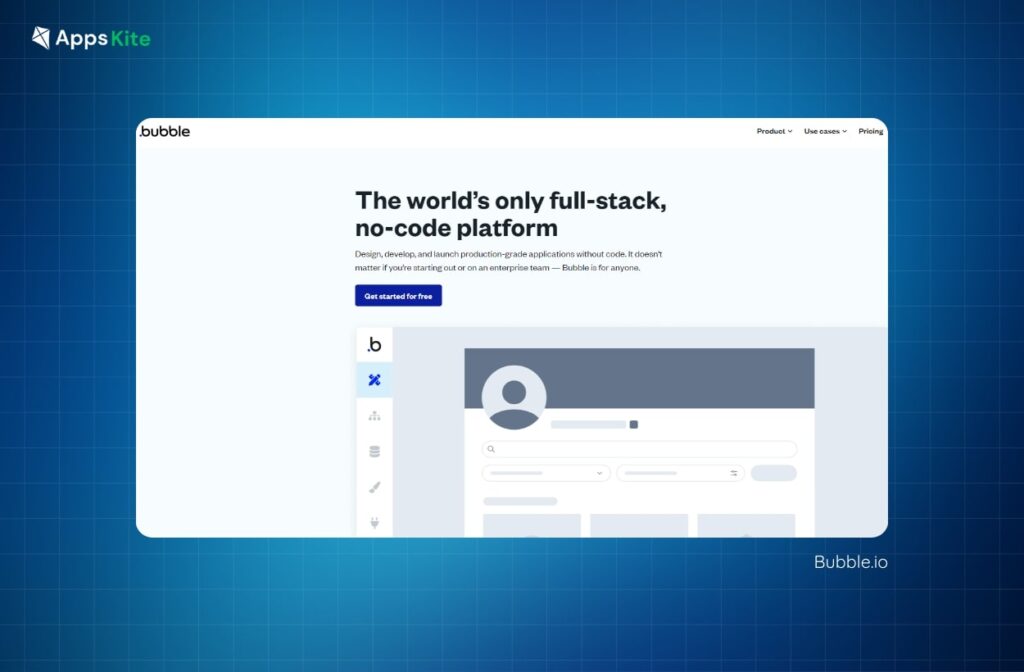
- Handles Lots of Users: Bubble has made millions of apps and deals with billions of visits each year. That means it can handle a lot!
- Loads of Extras: There are more than 6.5K ways to add extra stuff to your app, making it do all sorts of cool things.
- Top-Notch Security: It follows strict rules to keep your app and data safe, which is crucial, especially for big businesses.
It offers a user-friendly environment for building apps with customizable UI components and straightforward workflows.
- Building Apps Made Easy: Adalo’s like a magic wand for creating apps without needing to learn complicated code. It’s super simple, just like building with blocks.
- Create Your Own Style: With Adalo, you’re the artist! You can make your app look exactly how you want it. Pick your favorite colors, logos, and fonts to match your business’s vibe.
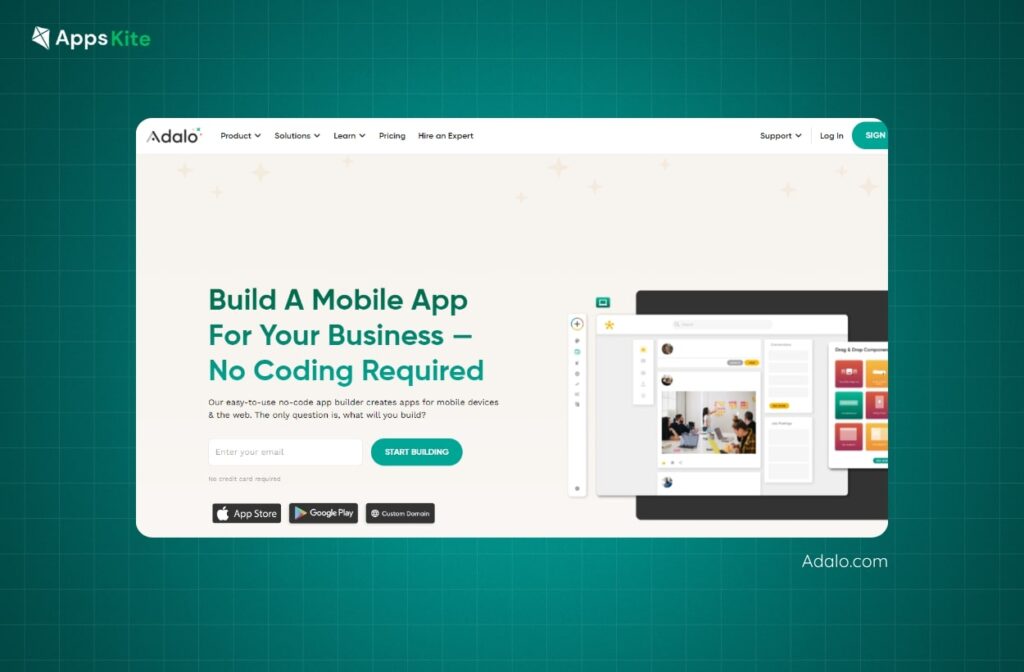
- Handling Data Hassle-Free: No need to stress about managing data. Adalo helps you organize it smoothly, whether you’re using its internal database builder or linking up with other tools like Xano.
- Reach Everyone Everywhere: Once you’ve made your app, Adalo makes it a breeze to share it with the world! Publish it across different app stores and domains, so anyone, anywhere, on any device, can use it.
- Lots of Cool Features, Lots of Help: It has got many cool things like special actions, ready-made templates, and connections to services like Zapier and Stripe. Plus, they’ve got experts who can guide you through making your app even better!
- Make Apps Without Code: Used by big companies like Nestle and Shopify.Easy for anyone—students, startups, or big teams—to create apps.
- Apps that Adapt: Makes apps that change based on where users are and what they like, even without the internet.
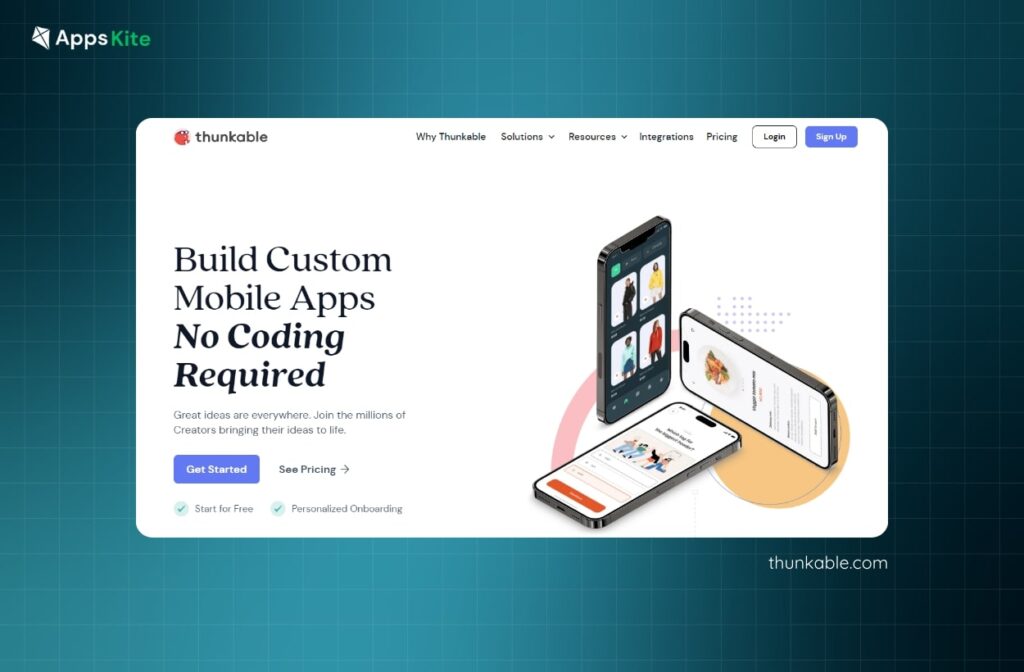
- Easy Design and Features: Offers lots of cool things (over 50!) to design apps easily. Helps put your app on Apple and Google’s app stores without headaches.
- Ready-Made Stuff and Your Own Ideas: Gives tools like maps and video players ready to use. Lets you think big with your own unique app ideas.
- For Everyone and Every Idea: Helps teachers teach, startups start up, and teams do new things. Makes it fast to try ideas, teach code basics, and show off new products.
Pros & Cons of No-Code App Builders
No-code app builders present several advantages:
| PROS | CONS |
|---|---|
| Reduces development time by eliminating the need for coding | Limited customization options for advanced apps. |
| They don’t require hiring professional developers, making app creation more affordable. | Building complex or highly scalable apps might be challenging. |
| Allows everyone (even without technical backgrounds) to create apps. | Might face disruptions or changes due to frequent platform updates. |
Is No-Code the Future of App Development?
Yes, No-code tools make it super easy for anyone. Even if they don’t know how to code at all, to create, test, and launch their own apps without any complicated steps! That means people with zero coding skills can build the apps they want. So, guess what? No-code is definitely the future!
Every company now needs software to succeed, and digital tech is everywhere. But making all these apps comes with challenges. That’s where no-code and low-code methods step in – they’re here to solve these tricky app-making problems.
These platforms are democratizing app creation, enabling anyone, regardless of technical expertise, to build and launch their own applications. No longer are complex programming languages and years of software engineering experience the prerequisites for bringing your digital vision to life.

Imagine aspiring entrepreneurs, educators, even marketing teams empowered to bring their ideas to the screen without needing to decipher lines of code. No-code empowers these “citizen developers” to build internal tools, educational games, e-commerce platforms, and even simple business apps like project management software. This not only frees up valuable developer resources for complex projects but also fosters a culture of innovation within organizations.
But the impact of no-code extends beyond individual empowerment. In an era where every company competes in the digital landscape, the rapid creation and deployment of software is crucial. Traditional development methods, often bogged down by lengthy timelines and resource constraints, can leave businesses lagging behind. No-code offers a solution, enabling faster prototyping, iterative development, and quicker adaptation to market demands.
However, it’s not all sunshine and rainbows. While no-code platforms can handle a vast range of functionalities, the complexity of certain applications may still require the expertise of traditional developers. Additionally, integrating these platforms with existing software ecosystems or building highly customized features might necessitate some coding savvy.
So, is no-code the sole future of app development? Perhaps not. But it’s undoubtedly a revolutionizing force, democratizing access to app creation and accelerating the pace of innovation across diverse industries. By bridging the gap between technical expertise and digital creation, no-code is paving the way for a future where anyone can be an app builder, and that’s a future worth embracing.
Also read: Is Figma Enough for Web Design?
Will No-Code Replace Developers? Fears Overblown, Future Empowered
For easy apps you make yourself, low-code works great. But if you want something fancier, like a really complex app, that’s where developers step in. As time goes on, these developers might use low-code tools to make cooler stuff, quicker.
The rise of no-code platforms has sparked a question on everyone’s minds: Will no-code replace developers? While its ease of use is undeniable, allowing anyone to drag-and-drop their way to an app, the reality is far more nuanced. No-code isn’t an extinction event for developers; it’s an evolution, empowering them to focus on complex problems while democratizing app development for a wider audience.
While anyone can build basic apps with no-code, these tools have inherent limitations. Complex functionalities, integrations, and scaling often require the expertise of seasoned developers. Imagine trying to build a skyscraper with Lego – you might get a charming mini-tower, but for anything functional and tall, you need an architect and engineers. Similarly, developers remain the engineers of the digital world, tackling intricate projects that push the boundaries of what’s possible.

No-code is a powerful democratizing force, enabling entrepreneurs, marketers, and even curious students to bring their ideas to life. This expands the app development ecosystem, creating a synergy between no-code creators and traditional developers. No-code platforms free developers from routine tasks, allowing them to focus on the intricate logic, security, and scalability that truly make an app shine.
Instead of replacing developers, no-code acts as a bridge, opening up app creation to a wider audience while simultaneously freeing developers to delve deeper into the technical complexities. This collaborative future promises not only a diverse landscape of innovative apps but also a more efficient and inclusive tech ecosystem. So, fear not, fellow developers, your skillset remains irreplaceable. Embrace the no-code wave, for it’s not a tsunami washing us away, but a rising tide lifting all boats in the exciting voyage of digital creation.
Building Apps Without Breaking the Bank: Free No-Code App Builders
Platforms like AppGyver, Adalo and Google App Maker offer comprehensive drag-and-drop interfaces, pre-built templates, and user-friendly workflows, all readily available at no cost. This empowers you to experiment, prototype, and build basic yet functional apps. Imagine crafting a simple inventory management tool for your small business, a personalized learning app for your classroom, or even a community news app for your neighborhood – all without spending a dime.
While free plans may have limitations on features, storage, or custom branding, they provide a sturdy foundation to hone your app-building skills and validate your concept before taking the plunge into paid plans.
Free-to-use platforms include:
- AppGyver (now part of SAP)
It is a full-stack visual development platform that allows you to build web and mobile applications without writing a single line of code.
It includes cloud services for backend building and smooth connectivity with SAP products, encouraging team collaboration.
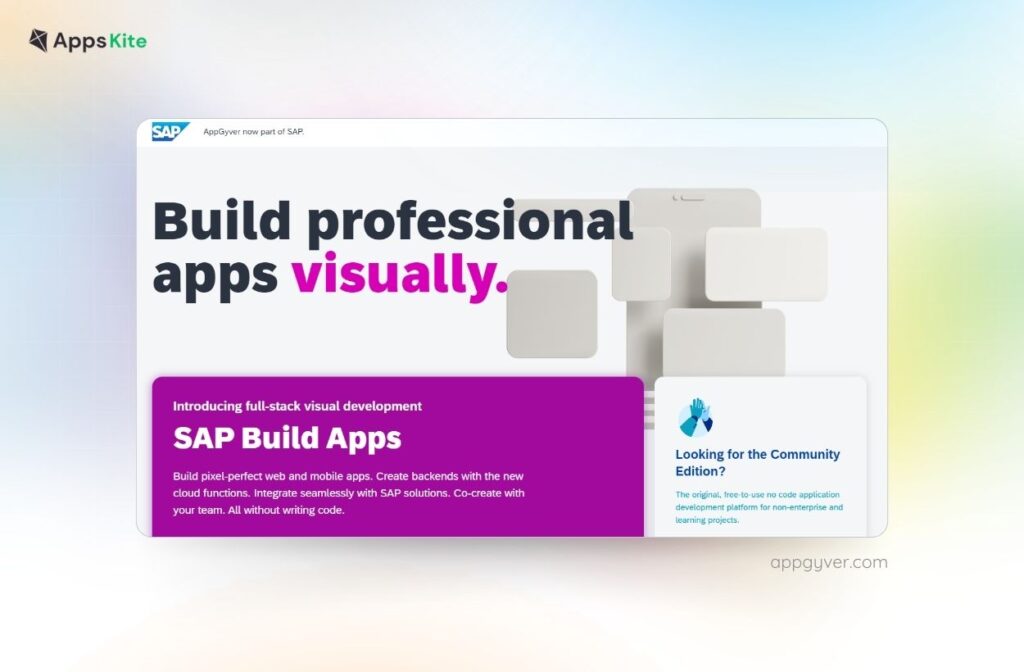
Key Features:
- Full-Stack Visual Development
- Cloud Functions for Backend
- Seamless SAP Integration
- Pixel-Perfect Designs
- Collaborative Co-Creation
- Code-Free App Building
- Google AppSheet
AppSheet is a Google no-code app development platform that allows for the simple construction and expansion of applications without the need for coding knowledge.
It uses Google AI and ML to automate corporate operations while also collecting rich data and allowing for offline synchronization. It emphasizes enabling every person to innovate via the use of Google Workspace capabilities to streamline work and collaboration.
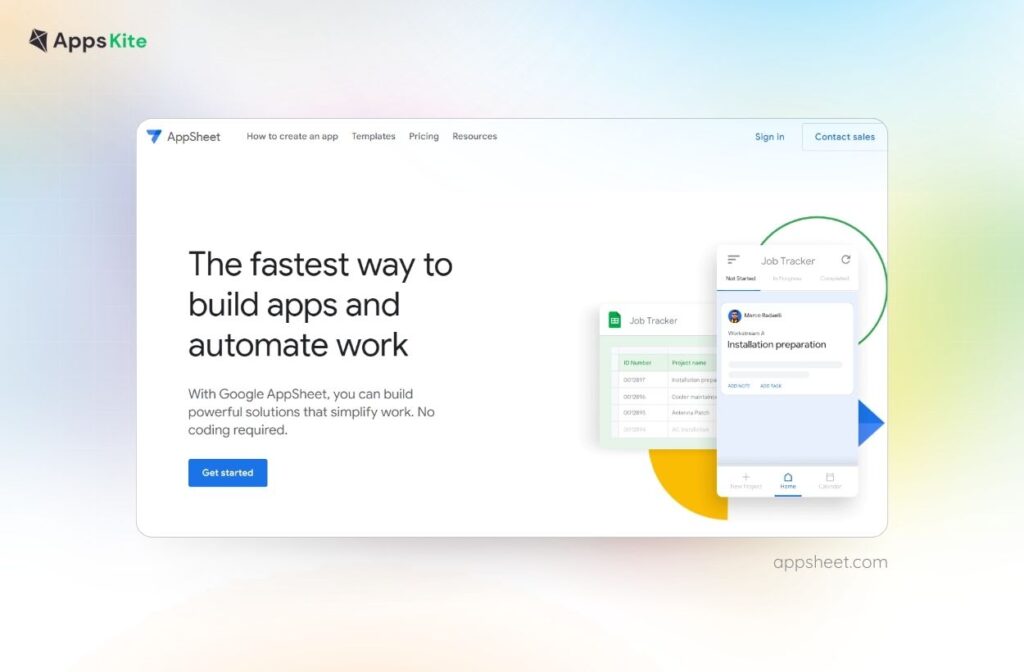
Key Features:
- No-code application development and automation
- Rich data collection and offline syncing
- Leveraging Google’s AI and ML for faster app development
- Scalability with governance for IT and citizen developers
- Democratizing development with accessible AI and ML capabilities
Finding Your Perfect Fit: Choosing the Right No-Code Platform
No-code platforms come in a rainbow of flavors, each with its own strengths and quirks. Picking the right one can feel like choosing a paintbrush for your masterpiece. So, ditch the guesswork and follow these tips:
- Know Your Needs: Are you building a simple mobile app, a complex web portal, or something in between? Different platforms excel at different things. Identify your core features and prioritize accordingly.
- Interface & Learning Curve: Does the platform feel intuitive? Can you drag-and-drop your way to success? Prioritize user-friendliness, especially if you’re a no-code newbie.
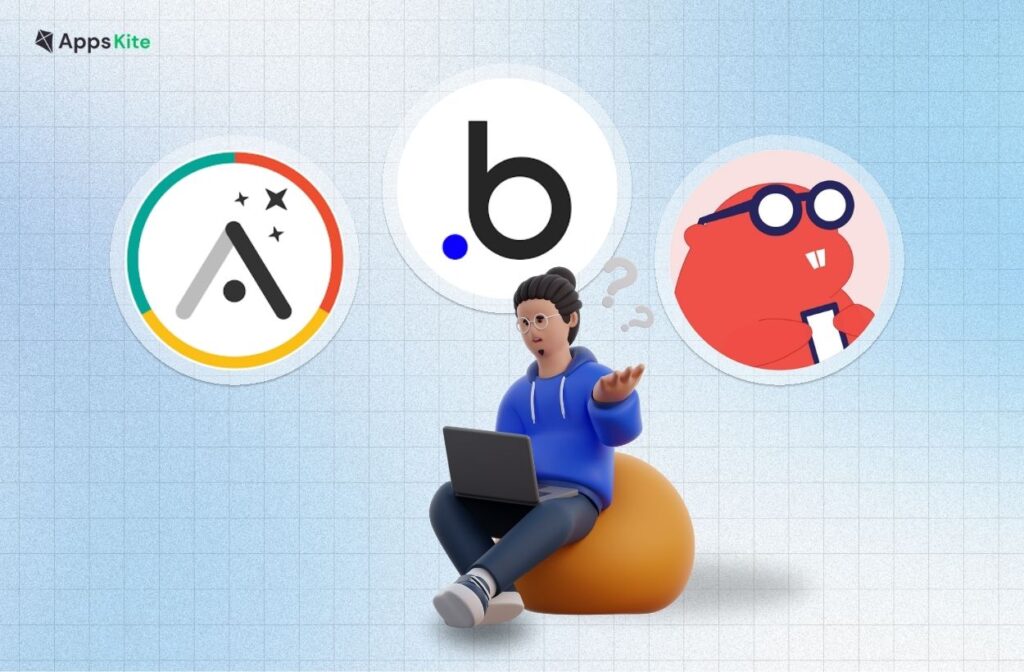
- Features & Flexibility: Does the platform offer the building blocks you need? Can you integrate with external services? Check if it covers everything from data integration to custom branding.
- Community & Support: Will you be flying solo? A strong community and responsive support team can be lifesavers when you hit a snag.
- Pricing & Scalability: Can you start small and scale as your app grows? Compare pricing models and ensure you can afford your future ambitions.
Remember, there’s no one-size-fits-all platform. Research, experiment, and choose the one that makes your app-building journey a joyride!
Beyond Drag-and-Drop: Mastering Advanced No-Code Techniques
Once you’ve mastered the basics, it’s time to push the boundaries of what’s possible. Here are some advanced techniques to take your no-code app to the next level:
- Conditional Logic & Workflows: Automate complex tasks and personalize user experiences with clever triggers and branching paths.
- Custom APIs & Integrations: Connect your app to a world of possibilities through custom APIs and existing integrations, from social media to payment gateways.
- Custom Design & Branding: Unleash your inner designer and break free from pre-built templates. Inject your unique style and brand identity into every pixel.
- Advanced Data Management: Dive deeper into data manipulation and analysis using built-in tools or external integrations. Uncover hidden insights and optimize your app performance.
- Custom Plugins & Extensions: Extend the platform’s capabilities with custom plugins and extensions. Don’t let limitations hold you back – build what you need!
Remember, advanced techniques are just tools. Use them thoughtfully to enhance your app’s functionality and user experience, not just for the sake of complexity.
Security & Privacy in No-Code Apps
While no-code platforms simplify app development, security and privacy concerns remain paramount. Here’s how to build a fortress for your users’ data:
- Platform Security: Choose a platform with robust security protocols, including data encryption, user authentication, and regular vulnerability assessments.
- Data Management: Understand how your platform handles user data. Encrypt sensitive information, implement access controls, and adhere to relevant data privacy regulations.
- Third-Party Integrations: Be cautious about integrating with external services. Assess their security practices and ensure they align with your own data governance standards.
- User Permissions & Privacy Policy: Define clear user permissions and inform users about data collection and usage practices through a transparent privacy policy.
- Stay Updated: Regularly update your app and the no-code platform to benefit from the latest security patches and bug fixes.
Remember, security and privacy are an ongoing process, not a one-time checkbox. Make these considerations a core part of your development and maintenance routine.
Wrapping Up
No-code app builders have made it possible for anyone, even those without coding skills, to create their own apps easily. These tools are like a shortcut, helping people turn their ideas into real apps without needing to learn complex coding languages.
But while these no-code tools are super handy and fast, they do have some limits. They might not be great for making really personalized or super big apps. They’re more like helpers for quick and simpler creations. Instead of replacing developers, these tools actually work together with them. It’s like having a team where everyone brings something different to make awesome things happen in the app world.
You may also like: How to Find Hidden Spy Apps on Android and What to Do Next
FAQs
1. Are no-code apps scalable for business needs?
No-code platforms might face challenges in handling highly scalable and complex applications due to their inherent limitations.
2. Do I need programming knowledge to use no-code app builders?
No, these platforms are designed for individuals without programming skills, utilizing visual interfaces for app creation.
3. Can no-code apps integrate with other systems or APIs?
Yes, many platforms allow integration with external systems and APIs to enhance app functionalities.
4. Are no-code apps suitable for enterprise-level solutions?
While feasible for some basic functionalities, enterprise-level solutions might require more extensive customization, posing challenges for no-code platforms.
5. Do no-code platforms limit the type of apps that can be created?
To an extent, yes. While they support various app types, complex, highly specialized apps might be challenging to create without coding.
6. How often do no-code platforms update their features?
No-code platforms typically undergo frequent updates, which may impact functionalities and user experience.
7. Can I monetize apps created using no-code platforms?
Yes, many platforms allow monetization, but certain limitations might affect revenue streams or advertising integration.









